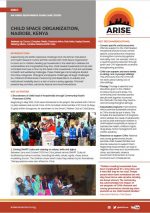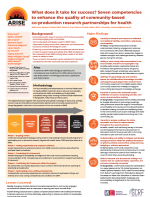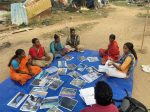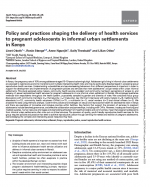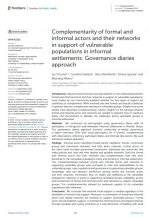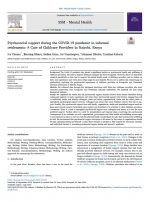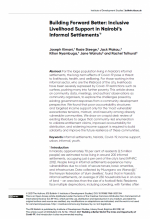Supported by the ARISE Responsive Challenge Fund, the African Population and Health Research Centre (APHRC) worked with Child Space Organization to reach out to children heading up households in the attempt to address the vulnerabilities and marginalities they face. Child headed households (CHHs) refer to families that have a minor as the head of the […]
Waste workers-otherwise known as sanitation workers-are often made invisible due to informal work arrangements. In India, as in other parts of the world, sanitation workers tend to be from the oppressed and marginalized communities with little access to healthcare and quality health services. This despite, their work being highly important to society and exposing them […]
Decolonising health research requires a shift to inclusive processes, and actively engaging with communities. Community-based participatory research (CBPR) fosters collaboration among communities, researchers, and implementers to produce contextual knowledge for action. Enhancing co-production skills and competencies has been shown to improve research quality and validity, while CBPR principles have been developed, limited guidance exists on […]
Waste pickers in India are extremely vulnerable to a range of health problems due to their poor living and unsafe working conditions, and struggle to access the health services they are entitled to. This research uses a community-based participatory research and focuses specifically on vector-borne diseases in two districts of Andhra Pradesh, exploring how they […]
In Kenya, the pregnancy rate of 15% among adolescents aged 15–19 years is alarmingly high. Adolescent girls living in informal urban settlements are exposed to rapid socio-economic transitions and multiple intersecting health risks and may be particularly disadvantaged in accessing sexual reproductive health services. Understanding vulnerabilities and service-seeking behaviours from different perspectives is important in order […]
In this episode of the Health Policy and Planning Podcast, LSHTM’s Public Engagement Manager, Karl Byrne is joined by our colleague Linet Okoth from LVCT Health. They talk about her paper “Policy and practices shaping the delivery of health services to pregnant adolescents in informal urban settlements in Kenya.” It’s a fascinating conversation that covers […]
Beyond several interests and speculations on the relationship between formal and informal actors and their networks in support of vulnerable populations, most studies do not conclusively establish whether the two types of support are substitutes or complements. While informal care and formal care may be substitutes in general, they are complements among the vulnerable groups. […]
The COVID-19 pandemic has placed a significant burden on psychosocial health and wellbeing of childcare providers. The need to support childcare managers has been recognized. However, there is to date little research specifically on how best to support the mental health needs of childcare providers, and no studies on their own experiences and views about what might be […]
Waste pickers in India are extremely vulnerable to a range of health problems due to their poor living and unsafe working conditions, and struggle to access the health services they are entitled to. This research uses a community-based participatory research and focuses specifically on mosquito-borne diseases in two districts of Andhra Pradesh, exploring how they […]
For the large population living in Nairobi’s informal settlements, the long-term effects of COVID-19 pose a threat to livelihood, health, and wellbeing. For those working in the informal sector, who are the lifeblood of the city, livelihoods have been severely supressed by COVID-19 restrictions such as curfews, pushing many into further poverty. This article draws […]
